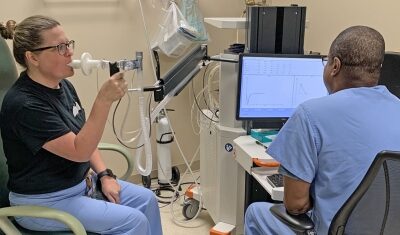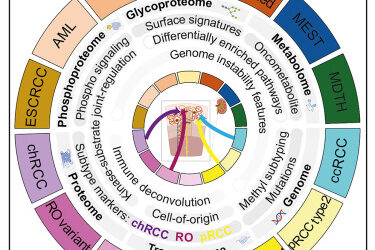In 2023, the American Thoracic Society recommended race-neutral interpretation of lung function and requested the investigation of “consequences for the yet-unquantified number of individuals with results near decision-making thresholds.”
Anti-TNF Agents Associated With Kidney Function Decline in IBD Patients
The introduction of biologic therapies, such as antitumor necrosis factor (TNF) agents, has revolutionized the management of inflammatory bowel disease (IBD)—a group of diseases characterized by chronic inflammation of the gastrointestinal tract.
Cytomegalovirus Examined in Breast Cancer Tumor Development
Cytomegalovirus (CMV), a herpesvirus that leads to lifelong infection, appears to play some role in breast cancer, according to a new study.
Why Do Surprising Distant Metastases Occur in 10-30% of ‘Cured’ Breast Cancer
PITTSBURGH — In most cases of breast cancer, no evidence of spread is found, the primary tumor is removed and the patient is as close to cured as possible, at that point. In 10% to 30% of cases in women, however, distant metastases recur after years to decades. “This...
New Efforts Seek to Reduce Treatment Time, Travel for Breast Cancer Patients
WASHINGTON — Earlier this year, the VA announced expansion of the "Close to Me" cancer program, with the understanding that access to medical centers providing specialty cancer care can be difficult for many veterans. The expansion will bring new cancer diagnosis,...
VHA Closely Follows Clinical Guidelines on Gender-Affirming Hormone Therapy
When initiating gender-affirming hormone therapy (GAHT) at the VHA, clinicians achieved high overall concordance between current GAHT initiation practices and guidelines, particularly for feminizing GAHT, according to a recent study.
Strong Links Found Between Obstructive Respiratory Disease in Veterans, Psychiatric Health Conditions
Veterans with obstructive respiratory disease should receive timely screening and treatment for comorbid psychiatric and medical conditions that frequently accompany the condition, according to a new study.
COVID-19 More Severe in Veterans With Chronic Lung Diseases
Veterans with chronic lung diseases, particularly idiopathic pulmonary fibrosis (IPF), other interstitial lung diseases (ILD) and chronic obstructive pulmonary disease (COPD), have an increased risk of experiencing more severe 30-day outcomes with COVID-19, according to a recent study.
Are PSA Values Reliable in Transgender Women to Detect Prostate Cancer?
In a VHA population, prostate-specific antigen (PSA) values in more than one-third of transgender women receiving estrogen were found to be undetectable, which indicates that PSA values in transgender women should be interpreted cautiously, according to a recent study.
Using Spironolactone to Treat HFpEG Reduced All-Caused Death
For veterans with heart failure with preserved ejection fraction (HFpEF), spironolactone use reduced all-cause death and demonstrated a favorable trend in reducing hospitalizations, according to a study of a real-world national cohort of patients with HFpEF.
Novel Psychotherapy Targeting Unresolved Trauma Reduces Chronic Pain in Older Adults Better Than Traditional CBT
Chronic pain in older adults can be significantly reduced using a newly developed psychotherapy called emotional awareness and expression therapy (EAET), which confronts past trauma and stress-related emotions that can exacerbate pain symptoms, according to a new study.
Shared Decision-Making Tool Promotes More Effective Use of Lung Cancer Screening
Research, including a new study of 57,000 U.S. veterans diagnosed with lung cancer, has shown that low-dose computed tomography lung cancer screening (LCS) saves lives.
Tracking Genetic Risk to Better Understand Which Veterans Have Alzheimer’s
Because of overlapping symptom profiles observed in cognitive disorders, psychiatric disorders, and environmental exposures such as head injury, clinicians can find it difficult to detect early signs of Alzheimer’s disease and related dementias (ADRD).
Pathogenic Variants Found in More Nonbladder Urinary Tract Cancer Patients
In an effort to evaluate factors that could affect the likelihood of identifying a clinically actionable germline pathogenic variant (PV), a new study investigated a real-world multicenter cohort of patients with urinary tract cancer (UTC).
Novel Genetic Associations Identified in So-Called Macular Pucker
Symptoms of epiretinal member (MRM), sometimes called macular pucker, can be severe and require surgery. Patients often complain of loss of central vision and/or visual distortion (i.e. metamorphopsia or “wavy vision”).
Agent Orange Exposure Not Linked to Hepatocellular Carcinoma
U.S. veterans are much more likely to be diagnosed with hepatocellular carcinoma, but at least one toxic exposure during military service doesn’t appear to have much to do with that.
GAO: Servicemembers in Need of Mental Health Services Are Falling Through the Cracks as They Transition to VA Care
Two recent investigations by the Government Accountability Office (GAO) have highlighted how seemingly small procedural issues and technical errors can lead to servicemembers and veterans not receiving much-needed mental health services.
Mohs Surgery at NY Harbor VAMC Reduced Reexcision, Rerepair Needs
Mohs micrographic surgery (MMS) is the standard of care for treating certain types of keratinocyte carcinoma (KCs), but it has not been uniformly accessible to veterans treated by the VHA, according to a recent research letter.
Study: High-Frequency Ultrasound Better as Supplementary Tool for Tumor ID
High-frequency ultrasound (HFUS) can safely and efficiently visualize cutaneous tumor characteristics including depth, but how accurate is it?
Changing DoD Drug Policy Could Open Enlistment for Psoriasis, Eczema Patients
Psoriasis and atopic dermatitis are disqualifying for entrance into the military. Both of the chronic, immune-mediated skin disorders can create difficulties wearing body armor and other protective equipment when poorly controlled, limiting a servicemember’s ability to train and deploy worldwide.
Diagnostics, Treatment Options Improve for Non-Clear Cell Renal Cell Carcinoma
When the law, widely known as the PACT Act, was signed into law two years ago this month, kidney cancer became a presumptive condition for VA care for the first time.
Genetic Sequencing Study Is ‘Step in the Right Direction’ Toward Improving Equity in VA Prostate Cancer Trials and Treatment
Prostate cancer affects an estimated 1 in 8 men at some point during their lives, with black men affected at almost double the rate of whites.
Remote Consent, Testing Used to Identify and Treat Germline Pathogenic Alterations in VA Million Veteran Program Participants
About 10% of men with metastatic prostate cancer show germline pathogenic alterations which can inform precision therapy, surveillance, and cancer prevention for family members, according to a recent study.
Increase in Military Deployment Raised Chronic Pain Threat for Servicewomen
The prevalence of chronic pain is documented to be several times higher in U.S. veterans than the general population. Efforts to deal with that unrelenting issue have led to myriad problems, including elevated rates of substance abuse.
Atrial Fibrillation Patients Less Likely to Receive Anticoagulant Therapy at VAMCs Serving More Minority Patients
VA patients receive different medical care for atrial fibrillation depending on whether they visit a VAMC serving more minority patients, according to a new study.
Revised Guidelines Give Recommendations Concerning Use of Newer Pharmacological Treatments for Type 2 Diabetes
The newest medications for Type 2 diabetes have benefits beyond controlling blood sugar. Evidence suggests they also reduce mortality and the risk of cardiac events.
Closing in on More Than a Half Century of Cancer Breakthroughs, VA Continues Pioneering Work in Oncology
The VA has been at the forefront of cancer research in the United States. Starting with the establishment of its first tumor research laboratory in 1932 and groundbreaking work in the 1950s on the association between smoking and respiratory tract cancers, the agency has repeatedly changed the course of oncology.
Military Study Finds That Pulmonary Hypertension Diagnosis Has Detrimental Effect on NSCLC Survival
A study from the VA and U.S. military research organizations addresses the question of how a diagnosis of pulmonary hypertension (PH) affect survival in patients with non-small cell lung cancer (NSCLC).
Highlights of the VA’s Contributions to Cancer Research
In the more than 90 years since the VA established its first tumor research laboratory at the Hines, Ill., VA hospital, the agency has published some of the most instrumental studies in cancer in the U.S.
In Advanced NSCLC, Frail Patients Receive Less Intensive Treatment Even If Performance Status Isn’t Poor
Immune checkpoint inhibitor (ICI) monotherapy is often preferred over intensive ICI treatment for frail patients and those with poor performance status (PS) in advanced non-small cell lung cancer (NSCLC).






